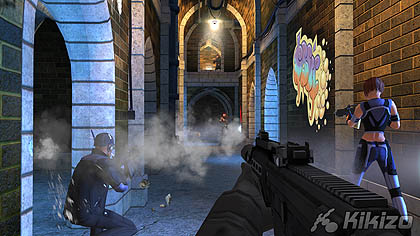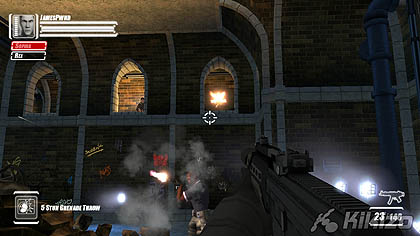The Agency: An Interview with SOE
We infiltrate Sony Online Entertainment to discover its PS3- and PC-bound project - potentially, a shooter like no other.
Page 3
Our walk through the inner sanctums of U.N.I.T.E. over with, O'Hara embarks on one of the game's instanced missions (for MMO-initiates, an "instanced" area generates a fresh copy of itself every time a new player or group enters that area, letting multiple players tackle the same mission without getting in each other's way). According to O'Hara, the ratio of public to instanced areas is 40:60. "We also have the concept of public-private," he goes on. "What we mean by that is that you go into a bar, there's all kinds of players in there, and then the assassin shows up and plays a little cinematic, "I'm about to attack you" or whatever. And we throw you into an instance for that bar so that you have the whole thing as your own space. And other players will have their own chance with that instance if they want."
And what kind of player support per area is SOE reaching for here? "Generally it's one to four players in the instanced environments, and then in public areas you can have much more people playing through, interacting with the same kind of missions," O'Hara hazards. "We wanted to make sure that in our instanced areas you had a really quality experience, so we wanted to keep the group tight.
"There will be public based missions which you could just go on, and there's other people playing there - it might be "rescue the hostage" and there's 30 other people trying to rescue that same hostage... you might want to wait for other people to clear the building for you, so you can have the easy access in, or you might want to help other people by healing them."
The mission we're shown is a relatively straightforward affair, with Sophie, Rex and James tailing ex-Soviet bomb plotters through Prague to the scene of their latest crime. As Sophie is unable as yet to put on a disguise or "alias" - a class skill awarded further down the line - O'Hara can't simply fade into the urban background. "If in fact you were dressed in the proper outfit, the enemy might not even notice you because, you know, you're not running around with an M16. But because we don't have an alias, we're actually have to rely a bit more on stealth to make sure we're not seen. In this case when the light's green, he's not paying attention. If it goes yellow or red he's going to look around, and you have just a few seconds to get into cover where he can't see you."
While you'll accumulate a fair few skills in your time as an agent, performing them on a controller shouldn't be a headache. "A lot of our skills are contextual. To be really friendly with the console audience, we want to make sure that most of our skills are not a huge skill bar that you find in something like World of Warcraft or Everquest II, but in fact are based on what you're doing. So if you go up to a door it might say you have the option to breach it, or unlock it, or kick the door down. That's based on your character."
As you'd expect, matching the right set of skills to the right challenges can make all the difference. "If a Doctor went up to that door all he could do is open it, which is a very obvious thing which enemies will hear right away," O'Hara explains. "A combat troop has the ability to breach it, which stuns the enemy for half a second, gives you enough time to get the drop on them."
If this streamlined approach, feeding the player options only where relevant, recalls any number of action titles - Brothers in Arms, the SOCOM games, Syphon Filter: Dark Mirror and so forth - The Agency's "Operative" system sit at the same table as Call of Duty 4's influential Perks. Operatives are scattered throughout the game world, and once recruited you can take a handful into the mission with you. There they function much like a secondary skill or accessory, supporting you in various, off-screen ways, both direct - gunning down a foe at your behest - or indirect - sabotaging a facility.
"Essentially, they're people you collect that help you do things," O'Hara explains. "They're your agents - not only are you an agent, but you collect people who off-screen do tasks for you." He illustrates this by having an Operative overload a set of nearby steam pipes, distracting the aforesaid ex-Soviets as they try to plant bombs under the German embassy. "You don't have to put an operative on it, but if you do it gives you a little bonus."







 Satoru Iwata Video Interview - the late Nintendo president spoke with Kikizo in 2004 as 'Nintendo Revolution' loomed.
Satoru Iwata Video Interview - the late Nintendo president spoke with Kikizo in 2004 as 'Nintendo Revolution' loomed. Kaz Hirai Video Interview - the first of Kikizo's interviews with the man who went on to become global head of Sony.
Kaz Hirai Video Interview - the first of Kikizo's interviews with the man who went on to become global head of Sony. Ed Fries Video Interview - one of Xbox's founders discusses an epic journey from Excel to Xbox.
Ed Fries Video Interview - one of Xbox's founders discusses an epic journey from Excel to Xbox. Yu Suzuki, the Kikizo Interview - we spend time with one of gaming's most revered creators.
Yu Suzuki, the Kikizo Interview - we spend time with one of gaming's most revered creators. Tetris - The Making of an Icon: Alexey Pajitnov and Henk Rogers reveal the fascinating story behind Tetris
Tetris - The Making of an Icon: Alexey Pajitnov and Henk Rogers reveal the fascinating story behind Tetris Rare founders, Chris and Tim Stamper - their only interview? Genuinely 'rare' sit down with founders of the legendary studio.
Rare founders, Chris and Tim Stamper - their only interview? Genuinely 'rare' sit down with founders of the legendary studio. The History of First-Person Shooters - a retrospective, from Maze War to Modern Warfare
The History of First-Person Shooters - a retrospective, from Maze War to Modern Warfare